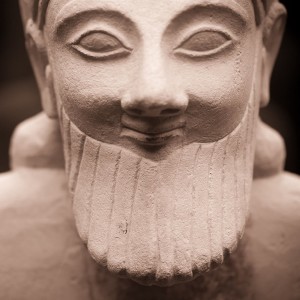
If you're listening to this month's Primary Source, you're hearing from the acts of Cyprus' patron saint, St. Barnabas. St. Barnabas was a Cypriot Jew who converted to Christianity and undertook missionary work across the island and beyond. In the Acts of the Apostles, he was accompanied by St. Paul most famously confronting a magician named Elymas, also known as "Bar-Jesus," and converting the Roman proconsul of Cyprus, Sergius Paulus -- that is, until an unknown disagreement where Barnabas and Paul went their separate ways.
But this month's Primary Source reading isn't from the Bible.
This is from a non-canonical work called the "Apocryphal Acts of St. Barnabas." They are one of many works of early Christianity that were rejected by the early Church Councils. The Acts of Barnabas is believed to have been composed in the 5th or 6th century and describes the missionary activities of Barnabas. The Acts of Barnabas includes stories of his travels to Cyprus, Antioch, and Rome, where he is said to have performed miracles, converted many people to Christianity, and established churches.
In this particular excerpt, we hear of Barnabas' missionary work in Cyprus, specifically in Amathus, where he encounters both pagans and Christian converts. He mentions condemning pagan athletics occurring in the nude outside of Kourion (which are promptly destroyed by an earthquake) and later, condemning a religious ceremony on the Acropolis of Amathus. In Salamis, however, Barnabas is taken and burned at the stake -- his remains were recovered in secret where he was buried with a copy of the Gospel of St. Matthew. These remains were said to have been found in the 5th century which would grant the Church of Cyprus autocephalic status.
Next month, I welcome Professor Georgios Deligiannakis to discuss the transformative years of early Christianity: "Holy Men & Heathens: The Last Pagans of Cyprus"
More Episodes
 2024-02-15
2024-02-15
 472
472
 2024-01-25
2024-01-25
 426
426
 2024-01-02
2024-01-02
 1.1k
1.1k
 2023-12-15
2023-12-15
 573
573
 2023-09-15
2023-09-15
 1.1k
1.1k
 2023-06-15
2023-06-15
 635
635
Create your
podcast in
minutes
- Full-featured podcast site
- Unlimited storage and bandwidth
- Comprehensive podcast stats
- Distribute to Apple Podcasts, Spotify, and more
- Make money with your podcast
It is Free
- Privacy Policy
- Cookie Policy
- Terms of Use
- Consent Preferences
- Copyright © 2015-2024 Podbean.com





